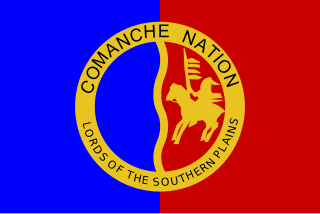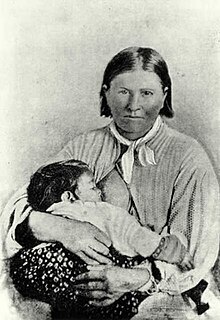Related Research Articles

The Comanche or Nʉmʉnʉʉ are a Native American tribe from the Southern Plains of the present-day United States. Comanche people today belong to the federally recognized Comanche Nation, headquartered in Lawton, Oklahoma.

The Searchers is a 1956 American Technicolor VistaVision epic Western film directed by John Ford and written by Frank S. Nugent, based on the 1954 novel by Alan Le May. It is set during the Texas-Native American wars, and stars John Wayne as a middle-aged Civil War veteran who spends years looking for his abducted niece, accompanied by his adopted nephew Martin.

Yodeling is a form of singing which involves repeated and rapid changes of pitch between the low-pitch chest register and the high-pitch head register or falsetto. The English word yodel is derived from the German word jodeln, meaning "to utter the syllable jo". This vocal technique is used in many cultures worldwide. Recent scientific research concerning yodeling and non-Western cultures has shown that music and speech evolved from a common prosodic precursor.

The Fort Parker massacre of May 1836, also known as the Fort Parker raid, was an event in which U.S. settlers of the Parker family were killed in an attack by a contingent of Comanche, Caddo, and Wichita fighters. During the attack, Cynthia Ann Parker, then 9-years-old, was captured and spent most of the rest of her life within the Comanche Nation, later marrying Chief Peta Nocona and giving birth to a son, Quanah Parker, who became a prominent leader of the Comanches and a war leader during the Red River War of 1874–75. Cynthia’s brother John Richard Parker was also captured and remained with the Comanches for six years before his release was negotiated. He was unable to readapt to Western society and chose to return to the Comanche Nation.

Quanah Parker was a war leader of the Kwahadi ("Antelope") band of the Comanche Nation. He was likely born into the Nokoni ("Wanderers") band of Tabby-nocca and grew up among the Kwahadis, the son of Kwahadi Comanche chief Peta Nocona and Cynthia Ann Parker, an Anglo-American who had been abducted as a nine-year-old child and assimilated into the Nokoni tribe. Following the apprehension of several Kiowa chiefs in 1871, Quanah Parker emerged as a dominant figure in the Red River War, clashing repeatedly with Colonel Ranald S. Mackenzie. With European-Americans hunting American bison, the Comanches' primary sustenance, into near extinction, Quanah Parker eventually surrendered and peaceably led the Kwahadi to the reservation at Fort Sill, Oklahoma.

Cynthia Ann Parker, also known as Naduah, was a white woman who was kidnapped in 1836, around age nine, by a Comanche war band which had attacked her family's settlement, and was then discovered and captured by the Texas Rangers, at approximately age 33, when they attacked her adopted tribe. Her Comanche name means "someone found" in English.

Dale Evans Rogers was an American actress, singer, and songwriter. She was the third wife of singing cowboy Roy Rogers.

Michael Martin Murphey is an American singer-songwriter best known for writing and performing Western music, country music and popular music. A multiple Grammy nominee, Murphey has six gold albums, including Cowboy Songs, the first album of cowboy music to achieve gold status since Gunfighter Ballads and Trail Songs by Marty Robbins in 1959. He has recorded the hit singles "Wildfire", "Carolina in the Pines", "What's Forever For", "A Long Line of Love", "What She Wants", "Don't Count the Rainy Days", and "Maybe This Time". Murphey is also the author of New Mexico's state ballad, "The Land of Enchantment". Murphey has become a prominent musical voice for the Western horseman, rancher, and cowboy.
The Comanche campaign is a general term for military operations by the United States government against the Comanche tribe in the newly settled west. Between 1867 and 1875, military units fought against the Comanche people in a series of expeditions and campaigns until the Comanche surrendered and relocated to a reservation.
A singing cowboy was a subtype of the archetypal cowboy hero of early Western films. It references real-world campfire side ballads in the American frontier, the original cowboys sang of life on the trail with all the challenges, hardships, and dangers encountered while pushing cattle for miles up the trails and across the prairies. This continues with modern vaquero traditions and within the genre of Western music, and its related New Mexico, Red Dirt, Tejano, and Texas country music styles. A number of songs have been written and made famous by groups like the Sons of the Pioneers and Riders in the Sky and individual performers such as Gene Autry, Roy Rogers, Tex Ritter, Bob Baker and other "singing cowboys". Singing in the wrangler style, these entertainers have served to preserve the cowboy as a unique American hero.

Ragtime Cowboy Joe is a popular western swing song. The lyrics were written by Grant Clarke and the music was composed by Lewis F. Muir and Maurice Abrahams. It was copyrighted and published in 1912 by F.A. Mills.
Don Edwards is an American cowboy singer and guitarist, who performs Western music. He has recorded several albums, two of which, Guitars & Saddle Songs and Songs of the Cowboy, are included in the Folklore Archives of the Library of Congress. Edwards also recorded the album High Lonesome Cowboy with Peter Rowan and Tony Rice.

The National Multicultural Western Heritage Museum, formerly the National Cowboys of Color Museum and Hall of Fame, is a museum and hall of fame in Fort Worth, Texas.

The Texas–Indian wars were a series of conflicts between settlers in Texas and the Southern Plains Indians during the 19th-century. Conflict between the Plains Indians and the Spanish began before other European and Anglo-American settlers were encouraged—first by Spain and then by the newly Independent Mexican government—to colonize Texas in order to provide a protective-settlement buffer in Texas between the Plains Indians and the rest of Mexico. As a consequence, conflict between Anglo-American settlers and Plains Indians occurred during the Texas colonial period as part of Mexico. The conflicts continued after Texas secured its independence from Mexico in 1836 and did not end until 30 years after Texas became a state of the United States, when in 1875 the last free band of Plains Indians, the Comanches led by Quahadi warrior Quanah Parker, surrendered and moved to the Fort Sill reservation in Oklahoma.

Isatai'i, Isatai, or Eschiti was a Comanche warrior and medicine man of the Kwaharʉ band. Originally named Kwihnai Tosabitʉ, after the debacle at Adobe Walls on June 27, 1874, for which he was blamed, he was known as Isatai'i. Isatai'i gained enormous prominence for a brief period in 1873-74 as a prophet and "messiah" of Native Americans. He succeeded, albeit temporarily, in uniting the autonomous Comanche bands as no previous Chief or leader had ever done. Indeed, his prestige was such that he was able to organize what was said to be the first Comanche sun dance, a ritual that his tribe had not previously adopted.

Ride Ranger Ride is a 1936 American Western film directed by Joseph Kane and starring Gene Autry, Smiley Burnette, and Kay Hughes. Based on a story by Bernard McConville and Karen DeWolf, and a screenplay by Dorrell and Stuart E. McGowan, the film is about a Texas Ranger working undercover to protect an Army wagon train full of ammunition and supplies. The Army doesn't believe him at first, until the Comanche arrive.

"Big Iron" is a country ballad written and performed by Marty Robbins, originally released as an album track on Gunfighter Ballads and Trail Songs in September 1959, then as a single in February 1960 with the song "Saddle Tramp" as the B-side single. Members of the Western Writers of America chose it as one of the Top 100 Western songs of all time.
"I'd Like to Be in Texas for the Roundup in the Spring" is a traditional American cowboy song. Like many traditional works, its authorship is not clearly documented. Sheet music for the song was first appeared in 1927, with Lou Fishback, Carl Copeland and Jack Williams listed as co-writers. The following year, the Texas Folklore Society printed an article by J. Frank Dobie, who claimed it was "an old song he had obtained from Andy Adams".

The Texas Trail Hall of Fame is a cowboy hall of fame in Fort Worth, Texas. Established in 1997, the building is located at 208 N.W. 24th Street, in the Fort Worth Stockyards National Historic District of the city.

Cowgirl II is a studio album by American country artist Lynn Anderson. It was released on January 28, 2010, via Showboat Records. The project was co-produced by Casey Anderson, Liz Anderson and Mark Moseley. The project was Anderson's second album of western music and the 36th studio release of her career. The album featured tracks mostly written by her mother.
References
- 1 2 "Catching up with cowboy troubador Don Edwards". Cowboys & Indians. 2010-01-01. ISSN 1069-8876 . Retrieved 2015-01-11.
But if there is one song I'm most associated with, that's 'Coyotes'.
- ↑ "Goin' Back to Texas - Don Edwards". allmusic.com. AllMusic . Retrieved 2015-01-11.
- ↑ "Don Edwards, Cowboy Singer". RootsWorld. Retrieved 2015-01-11.
- 1 2 "Top 20 Cowboy & Cowgirl Songs". Great American Country. Scripps Networks Interactive . Retrieved 2015-01-11.
See video #18 of 20
- ↑ Western Writers of America (2010). "The Top 100 Western Songs". American Cowboy. Archived from the original on 19 October 2010.